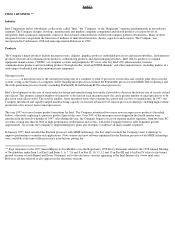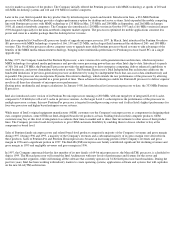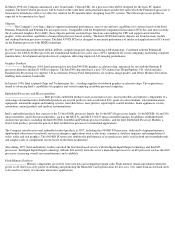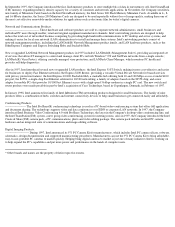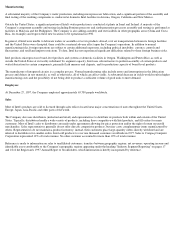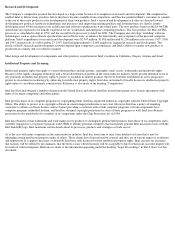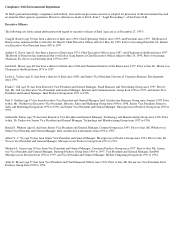Intel 1997 Annual Report Download - page 14
Download and view the complete annual report
Please find page 14 of the 1997 Intel annual report below. You can navigate through the pages in the report by either clicking on the pages listed below, or by using the keyword search tool below to find specific information within the annual report.
ITEM 3. LEGAL PROCEEDINGS
A. Litigation
EMI Group, NA v. Intel
U.S. District Court, District of Del. (C95-199-RRM)
On March 29, 1995, EMI Group, NA ("EMI") brought suit in Federal District Court in Delaware against Intel, alleging that certain Intel
manufacturing processes infringe a U.S. patent. In May 1996, the Court granted Intel's motion for summary judgment on some of the processes
in issue. In November 1996, the Court granted Intel's motion for summary judgment on the remaining processes in issue and entered judgment
in favor of Intel and against the plaintiff on the claims in EMI's complaint. A hearing on EMI's appeal of the grant of summary judgment was
heard in August 1997. No decision has been issued. Although the ultimate outcome of this lawsuit cannot be determined at this time,
management, including internal counsel, does not believe that the ultimate outcome will have a material adverse effect on Intel's financial
position or overall trends in results of operations.
Digital Equipment Corporation v. Intel U.S. District Court, District of Mass. (97-40080)
Digital Equipment Corporation ("Digital") brought suit in Federal District Court in Massachusetts in May 1997, alleging that Intel is infringing
ten patents in making and selling microprocessor products. Digital sought an injunction and monetary damages. If granted, the injunction
would prohibit Intel from using Digital's patented technology in its microprocessor products. The Company believes that its products do not
infringe the Digital patents. The Company filed a counterclaim against Digital for infringement of nine microprocessor-related patents, and, in
District Court in Oregon, the Company claimed that Digital infringes on six video and computer system patents. In October 1997, Intel and
Digital announced that they have agreed to establish a broad-based business relationship. The agreement includes sale of Digital's
semiconductor manufacturing operations to Intel, a 10-year patent cross-license, supply of both Intel and Alpha microprocessors by Intel to
Digital and development by Digital of future systems based on Intel's 64-
bit microprocessors. The two companies agreed to request a stay of all
lawsuits until government review of the agreement is completed, following which the lawsuits would be dismissed with prejudice. Although
the ultimate outcome of this lawsuit cannot be determined at this time, management, including internal counsel, does not believe that the
ultimate outcome will have a material adverse effect on Intel's financial position or overall trends in results of operations.
Intergraph Corporation v. Intel U.S. District Court, Northern District of Alabama, Northeastern Division
(CV-97-N-3023-NE)
In November 1997, Intergraph Corporation ("Intergraph") filed suit in Federal District Court in Alabama generally alleging that Intel attempted
to coerce Intergraph into relinquishing certain patent rights relating to microprocessor and chipset interaction in multiprocessor workstations.
The suit also alleges that Intel infringes three Intergraph patents and includes alleged violations of antitrust laws. The suit seeks injunctive relief
along with unspecified damages. In November 1997, Intel filed suit against Intergraph in Federal District Court in California seeking a
declaratory judgment that the Intergraph patents are invalid. Intel also filed an action in the same court alleging breach of contract and
misappropriation of trade secrets based on Intergraph's refusal to return Intel confidential information as contractually required. Although the
ultimate outcome of this lawsuit cannot be determined at this time, management, including internal counsel, does not believe that the ultimate
outcome will have a material adverse effect on Intel's financial position or overall trends in results of operations.


